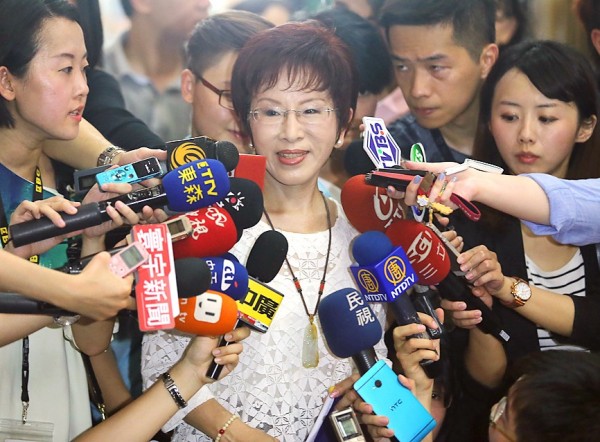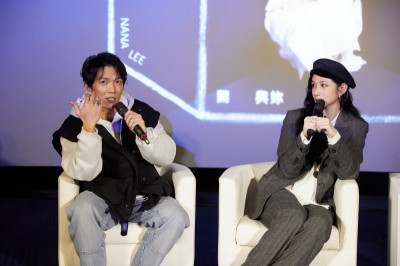《TAIPEI TIMES 焦點》 KMT elite might muzzle Hung

Chinese Nationalist Party (KMT) presidential hopeful Hung Hsiu-chu talks to reporters at a party event held in Taipei yesterday to mark 70 years since the end of the Chinese War of Resistance Against Japan. Photo: CNA
BLOWBACK: The Chinese Nationalist Party has urged presumptive candidate Hung Hsiu-chu to tone down her remarks about cross-strait relations, party sources said
By Shih Hsiao-kuang, Chen Yan-ting and Chen Wei-han / Staff reporters, with staff writer
Chinese Nationalist Party (KMT) headquarters is getting impatient with unilateral discourse on China issues from presumptive party presidential candidate Hung Hsiu-chu (洪秀柱) and plans to speak with her soon, party sources said.
During a TV interview on Thursday, Hung said her “one China, same interpretation” formula aims to have Beijing recognize the existence of the “government” of the Republic of China (ROC), rather than the “existence” of the ROC, which would constitute a “two-state theory.”
Hung’s formula is apparently at odds with the so-called “1992 consensus” — a supposed tacit understanding between the KMT and Beijing that both sides of the Taiwan Strait acknowledge there is “one China,” with each side having its own interpretation of what “China” means.
KMT Secretary-General Lee Shu-chuan (李四川) has said that the “1992 consensus” is entrenched in draft amendments to KMT policy guidelines that seek to realize a “five-point vision” put forward by former vice president and then-KMT chairman Lien Chan (連戰) and then-Chinese president Hu Jintao (胡錦濤) in 2005.
The five-point vision proposal includes the promotion of cross-strait economic exchanges, the termination of cross-strait animosity and the establishment of regular party-to-party communications platforms.
The draft amendments — pending approval at the party’s national congress scheduled for July 19 — would be the central platform on which all KMT candidates must base their election campaigns, Lee said.
Hung’s campaign office spokesperson Jack Yu (游梓翔) said that her policies — despite being worded differently — “are completely aligned with the ‘1992 consensus’ and the five-point vision as stipulated in the draft amendments.”
Hung has called on Beijing to recognize the existence of the ROC, a position espoused by President Ma Ying-jeou (馬英九) without being highlighted as Hung has done, Yu said.
The KMT has reportedly been urging Hung to tone down her speeches and put less emphasis on cross-strait relations to avoid controversies, while focusing her campaign on garnering support at the grassroots level.
Hung, rather than exposing her vulnerability with the “one China, same interpretation” formula, should base her position on the “1992 consensus” and exploit the Democratic Progressive Party’s (DPP) perceived weakness in its China policy — a strategy formulated by KMT Mainland Affairs Department director Kao Koong-lian (高孔廉) that Hung promised to maintain, but apparently has failed to do, party sources said.
The KMT caucus and a KMT think tank have set up a task force to assist Hung’s campaign, but the party is at a loss to help her with her repeated mistakes, the sources added.
A number of KMT legislators representing districts in central and southern Taiwan have raised concerns over Hung’s controversial remarks, party sources said, adding that Hung had called for a KMT caucus meeting to clarify her stance, but the initiative might not succeed, as the Legislative Yuan is in recess.
“The election is not an academic seminar, nor where a party’s direction is put to debate,” a pan-blue camp critic said, adding that Hung has sacrificed a winning hand against the DPP by throwing the KMT’s China policy into disorder and creating confusion among neutral voters.
The former DPP administration radicalized its cross-strait narrative in its final term in office, which — coupled with its failed administrative efforts — contributed to its defeat in the 2008 presidential and legislative elections, the critic said, asking whether the KMT could afford to repeat that mistake.
新聞來源:TAIPEI TIMES



















